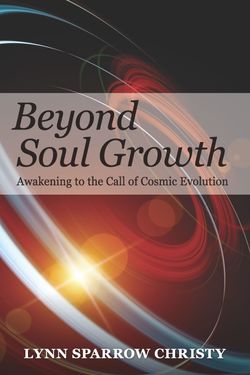Читать книгу Beyond Soul Growth - Lynn Sparrow Christy - Страница 21
На сайте Литреса книга снята с продажи.
Evolutionary Thought in the Cayce Readings
ОглавлениеCertainly the Cayce readings were on board with our crucial role in the renovation of the earth. It is no small thing from the evolutionary perspective that one of the most common terms for God in the readings is “Creative Force.” And it would seem that the Creative Force always intended the continuation of creation. One reading suggested that God rested on the seventh day in the creation story “…to let His purpose flow through that which had been made, that it might be perfected in itself.”13 This same divine intention that creation evolve toward completion rather than be a finished product at the start is reflected in the somewhat cryptic comment:
When the heavens and the earth came into being, this meant the universe as the inhabitants of the earth know same; yet there are many suns in the universe,—those even about which our sun, our earth, revolve; and all are moving toward some place,—yet space and time appear to be incomplete.14
An incomplete realm of time and space, a manifest world that is still unfolding, an aspect of the Ultimate that has an innate drive to express in form—that is the essence of the evolutionary story. As we already saw in the statement by Friedrich Schelling, God did not bring about the consummation of creation “in the beginning” because “God is Life, and not merely Being.” Made in the image of God, we too are characterized by the quickening impulse of life and not simply being. We do not exist simply to transcend the manifest universe and exist in changeless, eternal bliss, but rather to express the onward movement of life as it expresses through us in this world of form. “…For the purpose is that each soul should be a co-creator with God,” the Cayce readings tell us.15
Co-creativity is no mere incidental aspect of our being in the Cayce world view. It is at the very core of our purpose for being, for we are described as “…[children] of Creative Force…” and are told that we came into being in order to “…be a companion with the Creative Force, God, in its activity…”16 So intrinsic is our co-creative role that we are described as corpuscles in the body of God, where acts that reflect love are God's bloodstream and consciousness is like God's nervous system.17 Astonishingly, he even says that we are instrumental in the redemption of the world: “Know that self in the physical activative state is a part of the plan of salvation, of righteousness, of truth, of the Creative Forces or God in the earth.”18
Notice the repeated emphasis on activity in this world. We are not called to armchair philosophize about evolution, but to live out our evolutionary potential in the character of the lives we lead. This character is closely linked in the readings, as it is in most contemporary spirituality, with the quality of our consciousness:
For, the soul being a part or a shadow of the real spiritual self, it controls or rules the universe rather than being ruled by same. But, they that have entirely put on a consciousness are ruled by same. Hence, as each individual entity accepts and lives by this or that awareness, or consciousness, it gives power and spirit to same. Thus is each soul, each entity, a co-creator with that universal consciousness ye call God.19
In us, consciousness is waking up; and as it does evolution takes an enormous leap forward. In the words of Teilhard de Chardin:
Man is not the centre of the universe as once we thought in our simplicity, but something much more wonderful—the arrow pointing the way to the final unification of the world in terms of life. Man alone constitutes the last-born, the freshest, the most complicated, the most subtle of all the successive layers of life.20
We are evolution waking up to itself.
*Richard Maurice Bucke, Cosmic Consciousness (New York: Penguin Compass, 1991), 22.
5Although Lamarck's idea that acquired traits can be passed on to offspring was largely discredited for many years, by the 1920s some vindication for his theories began to show up in laboratory experiments in which successive generations of rats learned to navigate mazes with fewer and fewer learning trials (the acquired learning of the parents presumably passing on to their offspring) and reports from Pavlov that his famous conditioned response similarly affected subsequent generations of dogs. Today, a growing neo-Lamarckian perspective is supported by the field of epigenetics, which studies environmental influence on the activation of genetic codes.
6As quoted by Arthur Lovejoy in The Great Chain of Being: A Study of the History of an Idea (Cambridge, MA: Harvard University Press, 1936), 257.
7Friedrich Schelling, (1800), System of Transcendental Idealism, retrieved from en.wikipedia.org.
8Henry Drummond, (1883, p. 68), Natural Law in the Spiritual World, e-book.
9C.W. Leadbeater, (1912, p. 20), A Textbook of Theosophy, e-book.
10Rudolph Steiner, (1922), An Outline of Occult Science, e-book.
11Pierre Teilhard de Chardin, The Phenomenon of Man (New York: Harper and Row, 1961), 244. Fun fact: The priest, Father Telemond, in Morris West's 1963 novel, The Shoes of the Fisherman, was based closely on Teilhard de Chardin. Within that work, the reader will find an excellent and very reader friendly distillation of Teilhard de Chardin's thinking as well as an unfortunately typical reaction from the orthodox theological world.
121549-1
133491-1, emphasis added
145757-1, emphasis added
154047-2
16262-88
172174-2
182174-2
192246-1
20Teilhard de Chardin, The Phenomenon of Man, 223.
